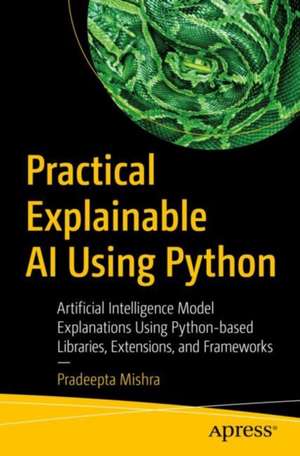Practical Explainable AI Using Python: Artificial Intelligence Model Explanations Using Python-based Libraries, Extensions, and Frameworks
Autor Pradeepta Mishraen Limba Engleză Paperback – 15 dec 2021
You'll begin with an introduction to model explainability and interpretability basics, ethical consideration, and biases in predictions generated by AI models. Next, you'll look at methods and systems to interpret linear, non-linear, and time-series models used in AI. The book will also cover topics ranging from interpreting to understanding how an AI algorithm makes a decision
Further, you will learn the most complex ensemble models, explainability, and interpretability using frameworks such as Lime, SHAP, Skater, ELI5, etc. Moving forward, youwill be introduced to model explainability for unstructured data, classification problems, and natural language processing–related tasks. Additionally, the book looks at counterfactual explanations for AI models. Practical Explainable AI Using Python shines the light on deep learning models, rule-based expert systems, and computer vision tasks using various XAI frameworks.
What You'll Learn
- Review the different ways of making an AI model interpretable and explainable
- Examine the biasness and good ethical practices of AI models
- Quantify, visualize, and estimate reliability of AI models
- Design frameworks to unbox the black-box models
- Assess the fairness of AI models
- Understand the building blocks of trust in AI models
- Increase the level of AI adoption
Who This Book Is For
AI engineers, data scientists, and software developers involved in driving AI projects/ AI products.
Preț: 313.81 lei
Preț vechi: 392.27 lei
-20% Nou
Puncte Express: 471
Preț estimativ în valută:
60.08€ • 65.23$ • 50.52£
60.08€ • 65.23$ • 50.52£
Carte disponibilă
Livrare economică 23 noiembrie-07 decembrie
Preluare comenzi: 021 569.72.76
Specificații
ISBN-13: 9781484271575
ISBN-10: 1484271572
Pagini: 340
Ilustrații: XVIII, 344 p. 194 illus., 144 illus. in color.
Dimensiuni: 178 x 254 mm
Greutate: 0.63 kg
Ediția:1st ed.
Editura: Apress
Colecția Apress
Locul publicării:Berkeley, CA, United States
ISBN-10: 1484271572
Pagini: 340
Ilustrații: XVIII, 344 p. 194 illus., 144 illus. in color.
Dimensiuni: 178 x 254 mm
Greutate: 0.63 kg
Ediția:1st ed.
Editura: Apress
Colecția Apress
Locul publicării:Berkeley, CA, United States
Cuprins
Chapter 1: Introduction to Model Explainability and Interpretability.- Chapter 2: AI Ethics, Biasness and Reliability.- Chapter 3: Model Explainability for Linear Models Using XAI Components.- Chapter 4: Model Explainability for Non-Linear Models using XAI Components.- Chapter 5: Model Explainability for Ensemble Models Using XAI Components.- Chapter 6: Model Explainability for Time Series Models using XAI Components.- Chapter 7: Model Explainability for Natural Language Processing using XAI Components.- Chapter 8: AI Model Fairness Using What-If Scenario.- Chapter 9: Model Explainability for Deep Neural Network Models.- Chapter 10: Counterfactual Explanations for XAI models.- Chapter 11: Contrastive Explanation for Machine Learning.- Chapter 12: Model-Agnostic Explanations By Identifying Prediction Invariance.- Chapter 13: Model Explainability for Rule based Expert System.- Chapter 14: Model Explainability for Computer Vision.
Recenzii
“Practical explainable AI using Python combines textbook and cookbook elements. It provides explanations of concepts along with practical examples and exercises. … this book offers a comprehensive foundation that will remain relevant for some time. However, readers should supplement their knowledge with the latest research in order to stay up to date in this dynamic field.” (Gulustan Dogan, Computing Reviews, August 21, 2023)
Notă biografică
Pradeepta Mishra is the Head of AI (Leni) at L&T Infotech (LTI), leading a large group of data scientists, computational linguistics experts, machine learning and deep learning experts in building next generation product, ‘Leni’ world’s first virtual data scientist. He was awarded as "India's Top - 40Under40DataScientists" by Analytics India Magazine. He is an author of 4 books, his first book has been recommended in HSLS center at the University of Pittsburgh, PA, USA. His latest book #PytorchRecipes was published by Apress. He has delivered a keynote session at the Global Data Science conference 2018, USA. He has delivered a TEDx talk on "Can Machines Think?", available on the official TEDx YouTube channel. He has delivered 200+ tech talks on data science, ML, DL, NLP, and AI in various Universities, meetups, technical institutions and community arranged forums.
Textul de pe ultima copertă
Learn the ins and outs of decisions, biases, and reliability of AI algorithms and how to make sense of these predictions. This book explores the so-called black-box models to boost the adaptability, interpretability, and explainability of the decisions made by AI algorithms using frameworks such as Python XAI libraries, TensorFlow 2.0+, Keras, and custom frameworks using Python wrappers.
You'll begin with an introduction to model explainability and interpretability basics, ethical consideration, and biases in predictions generated by AI models. Next, you'll look at methods and systems to interpret linear, non-linear, and time-series models used in AI. The book will also cover topics ranging from interpreting to understanding how an AI algorithm makes a decision
Further, you will learn the most complex ensemble models, explainability, and interpretability using frameworks such as Lime, SHAP, Skater, ELI5, etc. Moving forward, youwill be introduced to model explainability for unstructured data and natural language processing–related tasks. Additionally, the book looks at counterfactual explanations for AI models. Practical Explainable AI Using Python shines the light on deep learning models, rule-based expert systems, and computer vision tasks using various XAI frameworks.
You will:
- Review the different ways of making an AI model interpretable and explainable
- Examine the biasness and good ethical practices of AI models
- Quantify, visualize, and estimate reliability of AI models
- Design frameworks to unbox the black-box models
- Assess the fairness of AI models
- Understand the building blocks of trust in AI models
- Increase the level of AI adoption
Caracteristici
Covers the core features of explainability and how to execute them using Python frameworks Explains XAI features to interpret supervised learning algorithms, NLP components and deep learning neural networks Covers biasness, ethics and reliability description of AI algorithms and models.
